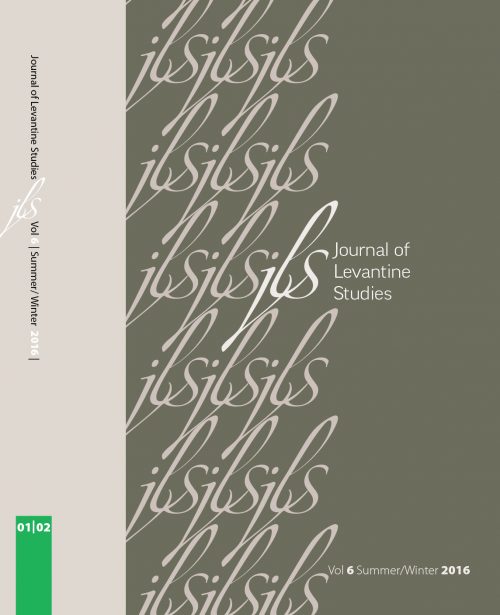-
Add to cartQuick view
Julia Phillips Cohen Becoming Ottomans: Sephardi Jews and Imperial Citizenship in the Modern Era Oxford: Oxford University Press, 2014. 219 pp.
Julia Phillips Cohen Becoming Ottomans: Sephardi Jews and Imperial Citizenship in the Modern Era Oxford: Oxford University Press, 2014. 219 pp.
$5.00Free!Add to cartQuick view -
Add to cartQuick view
Tomer Levi, The Jews of Beirut: The Rise of a Levantine Community, 1860s–1930s New York: Peter Lang, 2012. 230 pp.
Tomer Levi, The Jews of Beirut: The Rise of a Levantine Community, 1860s–1930s. New York: Peter Lang, 2012. 230 pp.
$5.00Free!Add to cartQuick view -
Add to cartQuick view
Between Cultural and National Nahda: Jewish Intellectuals in Baghdad and the Nation-Building Process in Iraq
Free!This article focuses on the role of Jewish intellectuals in defining a national and cultural identity for their coreligionists in Iraq during the establishment of the state by the British in the years 1921 until 1932. Based primarily on their contributions in the press, their poetry and memoirs, this article discusses the responsibility that Iraqi Jewish thinkers and writers took on themselves in order to participate in the national and literary revival, the Nahda, from which they hoped the entire Jewish community would benefit. Their responses to anti-imperialist debates in Iraqi intellectual circles and stance on sectarianism and secularism is examined through analysis of the themes and terminologies used by three Baghdadi Jewish intellectuals: Nissim Susa (1900-1982) Anwar Sha’ul (1904-1984), and Mir Basri (1911-2006). Is there a common trend among these three regarding their perception of the nation? How is writing employed to foster national consciousness?
Add to cartQuick view -
Add to cartQuick view
Center or Frontier: Hungary and Its Jews, Between East and West
Free!In the history of Hungarian political thought, East and West served as counter concepts. The first part of the article presents and analyses the history of the Eastern and Western political orientations of Hungarian nationalism from the late eighteenth to the mid-twentieth century. Key representatives of these orientations are presented with their versions of Hungarian “usable past.” Each orientation (Eastern or Western) views the second orientation as “other.”
The second part of the article describes how Hungarian Jewish spokespeople dealt with Hungarian nationalism vis-à-vis growing anti-Semitism in Hungary in the late 1930s and early 1940s. Using the East-West metaphors, some Hungarian Jewish spokespeople tried to present Hungary’s anti-Semitic campaign as stemming from foreign, non-Hungarian sources.
Add to cartQuick view -
Add to cartQuick view
“Anticonverso” Trends among Converted Jews in Seventeenth-Century Europe
Free!In the second half of the sixteenth century, and especially during the seventeenth century, the Iberian Peninsula became a magnet for Jews who had never been conversos, or who came of age as Jews. These men, who produced anti-New Christian discourses—as can be seen in some inquisitorial trials or in great intellectual debates—are perhaps best represented by João Baptista d’Este. In some cases New Christians were the major targets of their diatribes, even when their objective was, in an essentialist plan, to reiterate the fallaciousness of the Jews and of Judaism. The pressing question, also reiterated by Old Christians, was the New Christians’ supposed duplicity, often equated with iniquity, from which the new catechumens wished to distance themselves. The proof of the “falsity and ambiguity” of the conversos resorted to examples that were sometimes manufactured from their everyday life and from a “failed” plan to integrate another minority, the Moriscos, though their resounding expulsion became an equally ideal destiny to apply to the New Christians.
Add to cartQuick view -
Add to cartQuick view
The Portuguese Jews in Amsterdam and the Language of Liberty
Free!The exceptional freedoms granted to the Portuguese Jews who began settling in the Netherlands at the very end of the sixteenth century are well known, not only to scholars but to the wider educated public. This article addresses a development scholars have not, however, examined: how Portuguese Jews in the Netherlands came to grasp their new freedoms as an expression of universal political values (rather than mere largesse), and—most significantly—to identify with those values. This requires understanding the essentially religious and ethnocentric meaning of “freedom” in traditional Jewish discourse, where it is presented not as a good in itself but as an instrumental good, in that it facilitated the Jewish people’s proper service of God. Members of the communal elite who had immigrated from Portugal and Spain would have been familiar with the terms liberdade and libertad as abstractions of Iberian political philosophy with no practical significance. But in Amsterdam they would have become familiar with an idea of liberty as a universal right in matters of conscience that pertained to all subjects of a realm, and with an early form of civil religion that embedded the concept of liberty in a uniquely Dutch religiopolitical discourse. A close look at texts generated by Portuguese Jews in seventeenth-century Amsterdam reveals how members of the communal elite came to embrace (at least publicly) a concept of liberty in its universal political meaning, conflating it with a traditional Jewish narrative in a way that dovetailed with the emerging Dutch national narrative.
Add to cartQuick view
- Home
- About JLS
- Issues
- Vol. 9 No. 1 | Summer 2019
- Vol 8 No 2 Winter 2018
- Vol. 8, No. 1: Summer 2018
- Vol. 7, No. 2: Winter 2017
- Vol. 7, 1: Summer 2017
- Vol. 6, Summer/Winter 2016
- Vol. 5, No. 2 Winter 2015
- Vol. 5, No. 1 Summer 2015
- Vol. 4, No. 2 Winter 2014
- Vol. 4, No. 1 Summer 2014
- Vol. 3, No. 2 Winter 2013
- Vol. 3, No. 1 Summer 2013
- Vol. 2, No. 2 Winter 2012
- Vol. 2, No. 1 Summer 2012
- Vol. 1, No. 2 Winter 2011
- Vol. 1, No. 1 Summer 2011
- Blog
- dock-uments
- Subscribe
- Submit
- Contact





